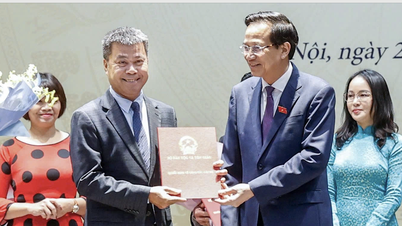The revised Law on Organization of Local Government was passed by the National Assembly on the morning of June 16 with 100% of the delegates present voting in favor (466 delegates). The law consists of 7 chapters, 54 articles and takes effect from the date of its passage.
Many major changes in decentralization and delegation of authority
The Law stipulates that Vietnam's administrative units are organized into two levels, including the provincial level (provinces, centrally-run cities) and the communal level (communes, wards, and special zones under the provincial level).
This is a major change compared to the current Law on Organization of Local Government, which stipulates a 3-level local government model (provincial, district and communal levels).
The two-level local government model was applied for the first time in Vietnam (Illustration: Hoang Giam).
Local authorities in administrative units, according to the provisions of the Law, include People's Councils and People's Committees.
Also according to the provisions of the recently passed Law, the National Assembly will decide to establish special administrative- economic units. These are areas with strategic locations, organized according to a specific model, applying superior preferential policies, implementing new policies on local governance, attracting investment, improving national competitiveness to promote socio-economic development of localities, regions and the whole country.
Regarding the division of authority of local authorities, the Law clearly states the principle of promoting decentralization, delegating tasks and powers of central State agencies to local authorities; clearly distinguishing between the authority of the People's Committee and the Chairman of the People's Committee at the provincial and communal levels.
The principle emphasized in the amended law is to ensure no duplication or overlap in tasks and powers between central and local State agencies, between local governments at all levels and between agencies and organizations under local governments.
Notably, the amended Law stipulates that, if necessary, the People's Committee and the Chairman of the People's Committee at the provincial level shall directly direct and manage the settlement of issues within the tasks and powers of specialized agencies and other administrative organizations under the People's Committee at their level, the People's Committee and the Chairman of the People's Committee at the commune level, so as not to let the settlement of work and administrative procedures for people and businesses be delayed, congested, or ineffective.
Regarding decentralization, local authorities are autonomous in making decisions, organizing implementation and taking responsibility within the scope of decentralized tasks and powers.
Provincial People's Committees are proposed to the Government to request the National Assembly to decentralize power to competent agencies, organizations and individuals at the local level to perform tasks and powers in accordance with the capacity and practical conditions of the locality.
The Government is responsible for considering and resolving the proposal of the Provincial People's Committee; in case of disagreement, it must respond in writing and state the reasons.
Regarding decentralization, the Law stipulates that the People's Committee and the Chairman of the People's Committee at the provincial level decentralize to public service units under their management to continuously and regularly perform one or several tasks assigned to them according to the provisions of law.
This regulation is to increase the autonomy of public service units in managing the unit and providing public services, except in cases where the law stipulates that decentralization is not allowed.
The Law clearly states that decentralization must be stipulated in legal documents of the decentralizing agency or individual. The decentralizing agency or individual is responsible for ensuring the necessary conditions for performing the decentralized tasks and powers, except in cases where the decentralized agency, organization, unit or individual requests and ensures the conditions for performing the decentralized tasks and powers.
National Assembly deputies press the button to pass the revised Law on Organization of Local Government (Photo: Pham Thang).
Provincial People's Committees are authorized to propose to the Government, Prime Minister, ministers, and heads of ministerial-level agencies to decentralize tasks and powers to competent local agencies, organizations, units, and individuals in accordance with the capacity and practical conditions of the locality.
Competent agencies, organizations, units and individuals at the local level may propose to the People's Council, People's Committee and Chairman of the People's Committee at the provincial level to decentralize their tasks and powers in accordance with their capabilities if they meet the requirements on finance, human resources and other necessary conditions.
In addition, the amended Law also clearly states the principles of delegation to increase the initiative of units.
Do not let administrative procedures be delayed or ineffective.
Previously, presenting a report on the reception, revision and completion of the draft revised Law on Organization of Local Government, Minister of Home Affairs Pham Thi Thanh Tra said that regarding the delimitation of administrative units and organization of local government in administrative units, the draft Law establishes a unified 2-level local government organization model (provincial and communal levels) nationwide, clearly defining the tasks, authority and organizational structure of each level of government; establishing a complete legal basis for the local government model in special economic zones.
National Assembly delegates attending the 9th session (Photo: Hong Phong).
At the same time, the Government has revised and supplemented regulations on administrative units, organizational principles and operations of local governments to ensure streamlining, efficiency, effectiveness, efficiency, closeness to the people, better serving the people, thoroughly implementing the principle of "local decision, local action, local responsibility", promoting the proactiveness, creativity, autonomy and self-responsibility of local governments.
In addition, the Minister of Home Affairs emphasized that the Law clearly states the principle of clearly defining the authority between the People's Committee collective and the individual Chairman of the People's Committee, creating conditions for implementing a flexible and effective management mechanism, encouraging the initiative and creativity of the heads of local state administrative agencies.
In response to the opinions of National Assembly deputies, the Government has revised and supplemented the regulations on the division of authority, decentralization, delegation and authorization.
Specifically, the Law adds the subjects of decentralization to be the People's Council and the Chairman of the People's Committee at the provincial level; adds a monitoring, evaluation and supervision mechanism to promptly adjust the contents of decentralization and delegation.
The Law also empowers the Chairman of the Provincial People's Committee to directly direct and manage the settlement of issues within the duties and powers of specialized agencies and other administrative organizations under his/her level and of the People's Committee and Chairman of the People's Committee at the commune level, so as not to let the settlement of work and administrative procedures for people and businesses be delayed, congested, or ineffective.
In addition, the Law has comprehensively redesigned the tasks and powers of local governments at two levels, ensuring no duplication or overlap.
In particular, the Law adjusts a number of tasks and powers of the People's Committee to the Chairman of the People's Committee; adds a provision that the Chairman of the People's Committee is allowed to decide on the tasks and powers of the People's Committee (except for contents that require collective discussion of the People's Committee) and report to the People's Committee at the nearest People's Committee meeting.
“This is a strong reform step to promote the responsibility of leaders, creating motivation for innovation in local governance,” the Minister of Home Affairs emphasized. These provisions of the Law will promote initiative, creativity, flexibility, and enhance the responsibility of the Chairman of the People's Committee, the effectiveness and efficiency of State administrative management and administration at the local level in accordance with practical requirements.
In particular, to promptly handle arising and unexpected situations not covered by legal provisions, the Law has established a flexible and proactive mechanism in the direction of allowing the National Assembly Standing Committee, the Government, the Prime Minister, ministers, heads of ministerial-level agencies, People's Councils and People's Committees at the provincial level to be responsible for reviewing and issuing documents or authorizing the issuance of documents to resolve issues arising when organizing local governments at the provincial and communal levels.
Dantri.com.vn
Source: https://dantri.com.vn/noi-vu/lan-dau-tien-ca-nuoc-van-hanh-chinh-quyen-dia-phuong-2-cap-20250615221122242.htm











































![[Photo] The 9th Congress of the Party Committee of the Office of the President, term 2025-2030](https://vphoto.vietnam.vn/thumb/1200x675/vietnam/resource/IMAGE/2025/6/20/78e7f27e8c4b4edc8859f09572409ad3)






















![[Maritime News] Wan Hai Lines invests $150 million to buy 48,000 containers](https://vphoto.vietnam.vn/thumb/402x226/vietnam/resource/IMAGE/2025/6/20/c945a62aff624b4bb5c25e67e9bcc1cb)






































Comment (0)